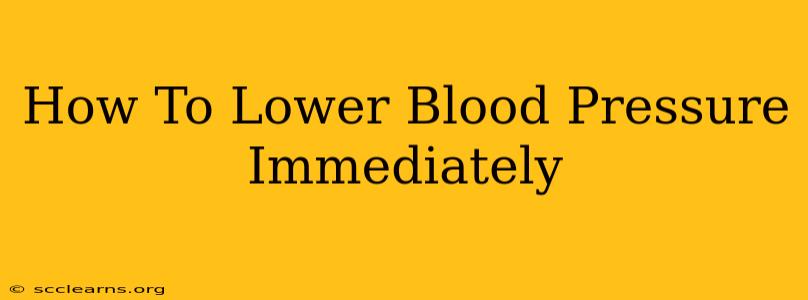High blood pressure, or hypertension, is a serious condition affecting millions. While medication is crucial for long-term management, knowing how to lower blood pressure immediately can be vital in emergency situations or to manage temporary spikes. This guide provides safe and effective techniques to help you bring your blood pressure down quickly. Remember, these methods are for immediate relief and should not replace prescribed medication or regular medical checkups. Always consult your doctor for personalized advice.
Understanding the Urgency: When to Act Fast
A sudden, significant increase in blood pressure can be dangerous. Symptoms like severe headache, dizziness, shortness of breath, or nosebleeds warrant immediate medical attention. Don't hesitate to call emergency services if you experience these symptoms. This guide focuses on managing temporary spikes or milder elevations, but your doctor should always be your primary resource.
Quick Ways to Lower Blood Pressure Immediately
These techniques can help lower your blood pressure relatively quickly, offering immediate relief:
1. Relaxation Techniques: The Power of Calm
Stress is a major contributor to high blood pressure. Practicing relaxation techniques can immediately reduce stress hormones and lower your blood pressure:
- Deep Breathing: Slow, deep breaths activate the parasympathetic nervous system, promoting relaxation. Inhale deeply through your nose, hold for a few seconds, and exhale slowly through your mouth. Repeat several times.
- Meditation/Mindfulness: Even a few minutes of meditation can calm your mind and lower your blood pressure. Focus on your breath, or a calming mantra, to quiet racing thoughts.
- Progressive Muscle Relaxation: Systematically tense and release different muscle groups to relieve physical tension and promote relaxation.
2. Lifestyle Adjustments for Instant Relief:
Certain lifestyle adjustments can provide immediate, albeit temporary, blood pressure reduction:
- Hydration: Dehydration can increase blood pressure. Drink a glass of water to help increase blood volume and reduce pressure.
- Avoid Caffeine and Alcohol: These substances can temporarily elevate blood pressure. Avoid them if you're experiencing a spike.
- Comfortable Posture: Avoid standing or sitting for extended periods. Stand up slowly to prevent dizziness.
3. Dietary Changes: Immediate Impact, Long-Term Benefits
While dietary changes won't offer instant, dramatic results, some adjustments can help within a short timeframe:
- Potassium-Rich Foods: Potassium helps balance sodium levels, reducing blood pressure. Bananas, spinach, and sweet potatoes are good sources.
- Lower Sodium Intake: High sodium intake contributes to hypertension. Avoid processed foods, fast food, and salty snacks.
Long-Term Management of High Blood Pressure
While the techniques above offer immediate relief, maintaining healthy blood pressure requires a long-term commitment. These essential steps are crucial for long-term management:
- Regular Exercise: Physical activity strengthens your heart and improves cardiovascular health. Aim for at least 150 minutes of moderate-intensity exercise per week.
- Healthy Diet: Adopt a balanced diet rich in fruits, vegetables, whole grains, and lean proteins. Limit saturated and trans fats, cholesterol, and sodium.
- Weight Management: Losing even a small amount of weight can significantly reduce blood pressure.
- Stress Management: Chronic stress contributes to high blood pressure. Practice relaxation techniques regularly.
- Medication: If you have hypertension, your doctor will likely prescribe medication to help control your blood pressure. Never stop or change your medication without consulting your doctor.
When to Seek Medical Attention
While these techniques can provide temporary relief, it is crucial to remember that they are not a substitute for proper medical care. Seek immediate medical attention if you experience:
- Severe headache
- Shortness of breath
- Dizziness or lightheadedness
- Chest pain
- Nosebleeds
- Blurred vision
This information is intended for general knowledge and informational purposes only, and does not constitute medical advice. It is essential to consult with a qualified healthcare professional for any health concerns or before making any decisions related to your health or treatment.

